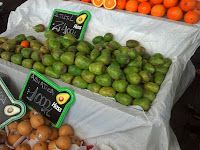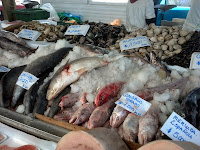With a resounding throttling of her opponent in last
Sunday’s runoff election in Chile, Michelle Bachelet confirmed what most
observers pretty much knew; she will be President of Chile for the second time,
taking over from Sebastian Piñera this coming March. Winning 62% of the votes cast surely suggests
broad support, especially since many suggested that anything over 55% would
indicate a mandate for her program, but it also provides evidence of a very
well prepared and implemented strategy to wrest the presidency away from the
rightist coalition that supported Piñera.
To do so, Bachelet carefully and systematically inserted herself back
into Chilean politics after a hiatus of four years, much of which was spent
living in New York City and heading up the nascent UN Women program.
From the day she arrived back in Chile from New York,
through the primary elections that put her firmly at the head of the “New
Majority” ticket, the first round election in which she defeated the eight
candidates convincingly but not enough to obtain the absolute majority
necessary to avoid a runoff election, to last Sunday’s ho hum confirmation vote
in which she not only held Evelyn Matthei to less than 40% of the votes but
also added a few hundred thousands of voters to those who voted for her the
first time, she built a solid case for why the voters should return her to the
Presidency.
As the campaign signs began to appear again in the streets
two weeks prior to the runoff election, a simple but telling distinction
clearly defined the choice the voters were facing: Bachelet stated clearly that she would
provide Chileans with “A New Constitution”, “Quality and Free Education for
all”, “Appropriate Pensions”, “More and Better Employment”, “More Green Areas”,
“More Sports”, “Culture For All”, “More Police, More Security”… more everything,
so much more that it began to be a bit ridiculous. But at the end it worked.
 Matthei, on the other hand, desperate to appeal to
additional independent centrist voters, adopted the oft borrowed and overused
phrase “Si Se Puede”, Yes We Can, to which the voters responded “no you
can’t”. Two signs I saw just before the
runoff election seemed to reflect well the juxtaposition the two candidates
were offering: Bachelet’s sign stated
“No More Abuses” (referring to recent scandals of consumer and corporate fraud
many Bachelet supporters claim are inherent in Chile’s free market, neoliberal
economic model), right next to Matthei’s sign stating “Yes We Can”. Surely the Bachelet sign was placed there
last, but it seemed to sum up each candidate’s message all too well.
Matthei, on the other hand, desperate to appeal to
additional independent centrist voters, adopted the oft borrowed and overused
phrase “Si Se Puede”, Yes We Can, to which the voters responded “no you
can’t”. Two signs I saw just before the
runoff election seemed to reflect well the juxtaposition the two candidates
were offering: Bachelet’s sign stated
“No More Abuses” (referring to recent scandals of consumer and corporate fraud
many Bachelet supporters claim are inherent in Chile’s free market, neoliberal
economic model), right next to Matthei’s sign stating “Yes We Can”. Surely the Bachelet sign was placed there
last, but it seemed to sum up each candidate’s message all too well.
 Matthei, on the other hand, desperate to appeal to
additional independent centrist voters, adopted the oft borrowed and overused
phrase “Si Se Puede”, Yes We Can, to which the voters responded “no you
can’t”. Two signs I saw just before the
runoff election seemed to reflect well the juxtaposition the two candidates
were offering: Bachelet’s sign stated
“No More Abuses” (referring to recent scandals of consumer and corporate fraud
many Bachelet supporters claim are inherent in Chile’s free market, neoliberal
economic model), right next to Matthei’s sign stating “Yes We Can”. Surely the Bachelet sign was placed there
last, but it seemed to sum up each candidate’s message all too well.
Matthei, on the other hand, desperate to appeal to
additional independent centrist voters, adopted the oft borrowed and overused
phrase “Si Se Puede”, Yes We Can, to which the voters responded “no you
can’t”. Two signs I saw just before the
runoff election seemed to reflect well the juxtaposition the two candidates
were offering: Bachelet’s sign stated
“No More Abuses” (referring to recent scandals of consumer and corporate fraud
many Bachelet supporters claim are inherent in Chile’s free market, neoliberal
economic model), right next to Matthei’s sign stating “Yes We Can”. Surely the Bachelet sign was placed there
last, but it seemed to sum up each candidate’s message all too well.
So, what happens now?
Will the predictions of the Wall Street Journal types and the
conservative right in Chile come true, that Bachelet will turn Chilean public
policies significantly enough to the left to discourage private investment so
necessary for Chile’s future growth?
Will she lead the country into a wrenching constitutional total rewrite
process? Will she carry out tax reform
that results in economic de-stimulation? Will she attempt to remove all private
investment in the education sector, returning education to total government
control? In short, in her rush to do
something significant about Chile’s unacceptable economic inequality will she
throw the proverbial baby out with the bathwater?
Or, will she move slowly and cautiously to remove from the
constitution those elements that inhibit a more representational political
system, to reform the tax system so she can change the way education is
financed (inserting more public monies especially at the primary and secondary level),
and to establish a government run pension system to compete with (and
eventually replace?) the private system now in place? One US-based academic who follows Chile very
closely recently stated that there is nothing about Bachelet’s team that
suggests significant changes, that rather than a shift to the left feared by
some, she will orchestrate a move to the center, ultimately making Chile “about
as Socialist as the US”.
Regardless of how one sees it evolving, the President Elect
has successfully completed the easy part, and now her skills at governing, not
campaigning, will be tested. She has
promised a lot, the world in fact, and she can in no way deliver all she has
promised especially in the short term. Admittedly,
she did not offer many details about how she would go about implementing her
program. Many of her projects, if they
are to result in “fundamental change” as she suggests (but which the
commentator cited above does not believe), will take time. Even though she seems to have the majorities
she needs in the Congress to get the legislation required to do most of what
she has offered, she is dependent upon legislative support of a very diverse
coalition, from the Communists on the left to the Christian Democrats and
Radicals in the center (maybe even center-right). If she proceeds with grand, complex projects
of constitutional, tax system, and education reform, she runs the risk of
producing another “Transantiago”, or at least the appearance of one, and
getting tied up in long, time consuming deliberations. If she slowly attacks these problems, which
by the way most Chileans do agree need reform of some form, in chewable bites
she runs the risk of disappointing her support on the left end of the spectrum
and will be challenged increasingly from civil society’s favorite forum, “The
Street”.
I have a feeling, though, that the three big issues, a new
constitution, free public education at all levels, and tax reform will soon be
addressed one way or another, and that other issues, that have not received
much attention in the campaigns, will soon become urgent issues for Bachelet’s
attention: energy policy, rights and
roles of the indigenous people, environmental protection and its importance for
the growing tourism industry, the effects of climate change on agriculture,
forestry, and coastal development.
And of course, Chile’s relations with its neighbors need
some attention. Soon the International
Court in The Hague will make public its response to Peru’s claim for adjustment
of the maritime border between the two countries. However this comes out, it will present a
very delicate and potentially serious internal political and public opinion
problem. There is the Bolivian claim
(dream) of access to the Pacific Ocean that will continue to irritate relations
between the two countries. Frankly, if
you step back and view this issue with a broad lens, you would have to believe
that a solution should be able to be found to this situation between two
neighbors both of whom would greatly benefit from resolution of the issue and a
more comprehensive bilateral cooperative relationship. And Argentina, well, Bachelet and Kirchner
seem to be able to get along, in spite of their differences, so that
relationship should be friendly.
Hopefully both countries continue to work together to improve the
transportation infrastructure and natural area preservation along the length of
their common border, and that this most spectacular stretch of the Andes
mountains becomes increasingly an attractive destination for lucrative
nature-based tourism.
So, Bachelet has from now until March to name her team and
craft her projects. We will begin to
have some clues as to how “fundamental” the changes she has promised will be as
she names her Ministers of Hacienda (dismantle the free market “model” or stay
the course), Interior (serious effort to deal with the needs and aspirations of
the Mapuche), Foreign Affairs (Stay committed to the economic Pacific Alliance or
revert to stronger economic relations with Brazil and the Mercosur), and
Environment (strong promotion of natural area protection, rational water use,
sustainable forest and fisheries development, strong, timely environmental
impact assessments prior to development project decision-making, or a
continuation of hands off laissez faire approaches to environmental
protection). An important issue is
whether or not Bachelet continues to support an independent Central Bank. If she backs off this, it would have to be
classified as “significant change”.
Chile is heading into a period some on the inside predict
will lead the country back to the “chaos of the late 1960s and early 1970s”,
others believe this is precisely what the country needs to “erase the dark
footprint of the military dictatorship and its economic model”. Rising expectations and the inability of the
Piñera government to satisfy these or even convince the majority of Chileans
that he even wanted to satisfy their needs and desires led to his low
popularity that spilled over negatively on the Matthei campaign. Bachelet is facing an even higher level of
expectations, especially from the poor and the middle class; much of this
fervor for change has been fed by her own litany of campaign promises. She has done very little to prepare the great
majority of Chileans for the reality they will all face in March when she takes
over the Presidency, the sacrifices some will have to make and the time it will
take to deliver her program. She does,
however, have a keen ability to show her empathy for what the common folks are
facing, so she will have something of a honeymoon period, but that could end
very quickly when these same folks begin to sense that either she really didn’t
mean to deliver everything she promised, or that she just isn’t able to
deliver.
So let’s see who she picks to join her team. I, for one, will be in Chile in March to
witness her move back into La Moneda. It
will be interesting, for it starts what will surely be another very interesting time
for Chile and Chileans.
Posted in Leesburg, Virginia on December 20,2013









































